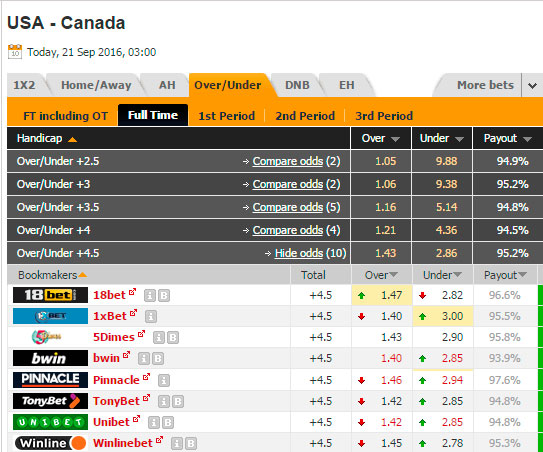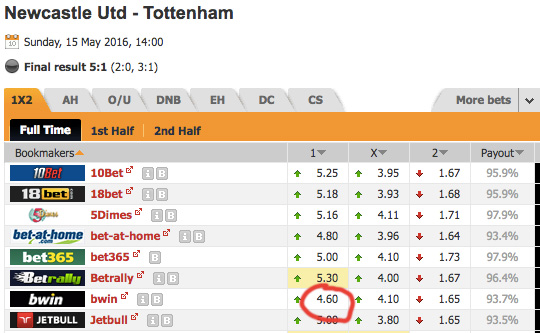Contents
How to use value betting and find a value bet coefficient at bookmakers’ offices? Let’s carry out two experiments in manual search and scanner search.
The Right Way of Value Betting
Value betting system is a strategy that offers players to bet on underrated events.
Value betting is betting on underrated events at bookmakers’ offices, i.e. events with coefficients rated higher than the real ones.
Let’s refer to the theory of probability to fully understand the nature of this strategy.
Question: Why do most players lose their money at bookmakers?
Answer: Because they bet on coefficients offered by bookies without thinking about statistics and probability long-term.
Not clear? I’ll explain it by giving you an example, remember that you will not get this info from bookmakers: say, you always bet $200 on 1.6 coefficient. This means that the bookie defines the outcome probability of that event as 100/1.6 = 62.5%.
It means that statistically speaking you will unwittingly lose long-term in 37.5% of cases. It annihilates the money you won before.
The altogether mathematical expectation of the average profit you might have will make:
Profit = P*(K-1)*V — (1-P)*V
Where,
- P — probability of the event (values from 0 to 1);
- K — bookmakers’ coefficient;
- V — the money you bet.
Now let’s calculate the real numbers from the example above
Profit = 0.625* (1.6 – 1)*200 – (1-0.625)*200 = 75 – 75 = 0

Bad news, right? Here’s some more. You also have to note that bookmakers have margin (which means that the default probability percentage is even higher while the coefficient is lower — you can find more info on margin here) and it results in the profit less than 0. I think you already got what it means.
So what can we do it about it?
For now, let’s get back to defining the meaning of value bet.
Value betting is a strategy where you have to place your bets on underrated coefficients with advantage over a bookmakers’ office. This means that you believe that the probability set by the bookmaker is not the real possible outcome.
An example: in an Argentina vs Chile match a bookie sets 1.6 coefficient for Argentina winning which means that the probability of such event is 62.5%, while you think that the probability is 80%. It means that the real coefficient must be 100/80 = 1.25
How to figure out a value bet situation here? The following condition must be fulfilled (value betting formula):
K * P > 1
- K – bookmakers’ coefficient;
- P – your probability of the event.
Now let’s calculate it by using the real numbers from the example above:
1.6 * 0.8 = 1.28 > 1
1.28 – 1 = 0.28. It means that if you bet on such events, then your long-term profits will make 28% from each bet even if you keep losing.
(You can find a value bet calculator below so that you don’t need to calculate it manually.)
Now we can insert the numbers into the formula which reflects mathematical expectation of average profit. Keep in mind that the player is going to place 100 bets.
Profit = 100 bets * 0.8 * (1.6-1) * $200 – 100 bets * (1-0.8) * $200 = 9600 – 4000 = $5600.
Which was to be approved.
How Much to Bet
You can use the Kelly Criterion strategy to choose the optimal amount of money to place bets depending on risks and level of underrated outcomes. It allows you to calculate the percent of the pot you can place on a current bet.
How to Find Value in Sports Betting
This is great but how to find value bets in soccer, hockey, tennis, and other sports where the value of bets is defined by overrated coefficients.
Here are 3 possible ways of detecting value bets.
Manual Search of Overestimated Coefficients in Game Lines
If you’re an expert in a certain sport and you consider yourself a genuine talent who can assess all the factors influencing the outcomes of events, go for it. Although I strongly doubt that your expertise can be better than the knowledge professional teams at bookmakers’ offices.
Search by Using a Value Bet Detector aka Value Betting Service
The principle of such value bet checkers is based on scanning coefficients for a certain event at a large number of offices to calculate an arithmetical average. After that the arithmetical average is compared to each coefficient one by one.
By hypothesis the arithmetical average is the most precise value, because in fact it’s the value calculated by the experts from all the scanned bookmakers’ offices.
We can conclude that the value which is bigger than the arithmetical average is the underrated event you are looking for.
How to find websites and software scanning value bets? Many of the services from this rating provide such opportunity.
Value Betting Finder in Arbitrage Bets
Arbitrage is the source. The existence of an arbitrage bet indicates that one of the events is underestimated. Arbitrage is in fact an initiator for value betting. More info about arbitrage is here, you might learn a lot from that information.
If the service returns live arbitrage results then you can use live value bets. Their disadvantage is that you don’t have enough time for thorough analysis.
Let’s get back to the meat… After analyzing coefficients from other offices you can easily make value bet predictions of the most underrated events.
Let’s make calculations by using real coefficients.
Value Betting in Actual Practice. 2 Cases
Case 1. Searching Bets by Using Scanners
Let’s analyze a real arbitrage in a hockey match of USA vs Canada:

1/1.5+1/3.32 = 0.9678 < 1, which indicates an arbitrage opportunity
Now let’s detect the overestimated coefficient by analyzing other bookmakers.

Now let’s calculate both average values:
(1.47+1.4+1.43+1.4+1.46+1.42+1.42+1.45) / 8 = 1.43
(2.82+3.0+2.9+2.85+2.94+2.85+2.85+2.78) / 8 = 2.87
It’s live, anything is possible, so what we have here is that both outcomes are underrated.
- 1.43 < 1.5 in 1.5-1.43 = 0.07 makes 3.27%
- 2.87 < 3.32 in 3.32-2.87 = 0.45 makes 4.72%
You can bet on any outcome, but the Under (4.5) outcome is more underrated so let’s bet on it.
Case 2. Manual Search
Case for manual detecting of a value bet.
As an example let’s take a Newcastle vs Tottenham match in English Premier League. Let’s assume that you’ve carried out a careful analysis before the match and realized that the bookmakers set wrong coefficients. Now we need to prove your point.
You can use the aforementioned formula for it:
K * P > 1
The coefficient for the home team winning is 4.6. According to the statistics of the previous matches Newcastle usually wins 1 match out of every 4 of them. It means that based on the probability theory the home team wins in 25% of matches.
When inserting the values into the formula we will get this: 4.6 * 0.25 = 1.15. If the result is over 1, then the bet will be profitable.

As you can see from the example above, our bet has made a great play. Although the whole system is quite questionable. Value bet strategy is great in the longer term. The important thing is that the result of the formula should be over 1.
Value Bet Calculator
For your convenience we place the value betting calculator, an online service where you figure out the profitability of bets.
- field — here you should enter the coefficient provided by a bookie for a certain event;
- field — here you enter your own assessment of the possible outcome of the event in percentage terms.
Then hit the “Calculate” button. You will see a number and value bet tips on profitability of such bets according to the value betting system.
Conclusion. Is It Profitable to Use Value Betting? Feedback
The answer is YES according to the probability theory, but:
- You need a great number of the bets to let the statistics have its effort (not just 10, 20, or even 100, but much more). Are you ready for it?
- Are you sure that the bets you’re going to use are value bets, indeed?
Some arguments can be brought forward in defense of the strategy:
- Compared to the arbitrage bets you don’t have to risk and place stakes on all the bets at once.
- Your account will not get blocked because your activity will imitate an average player’s behavior.
- The result is much more profitable than in the case of the arbitrage strategy.




